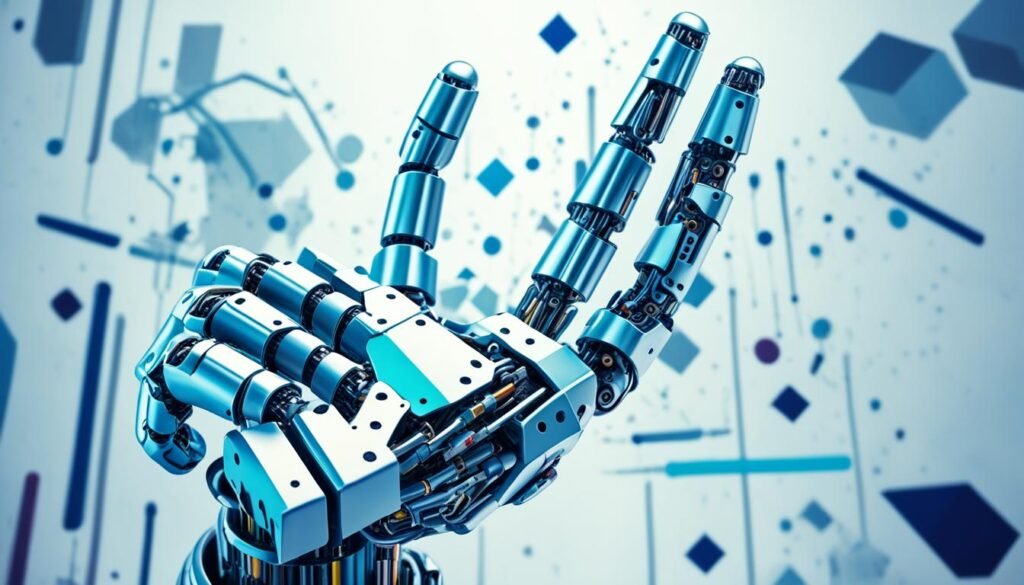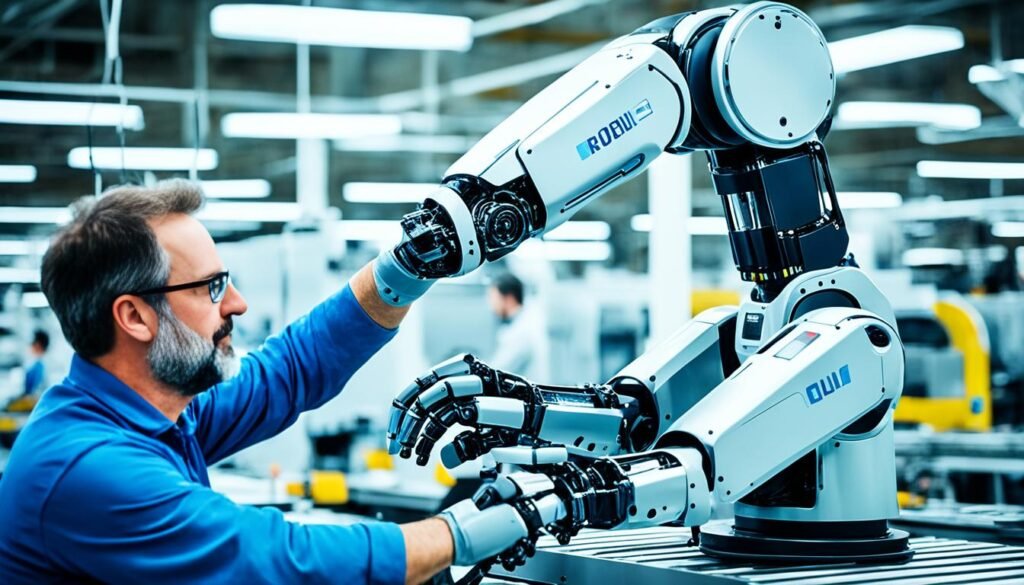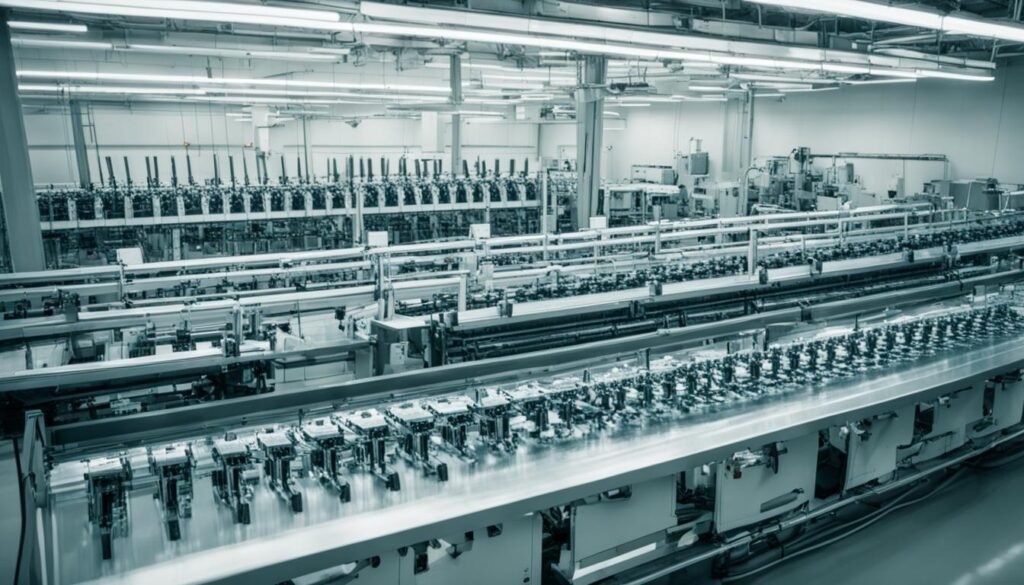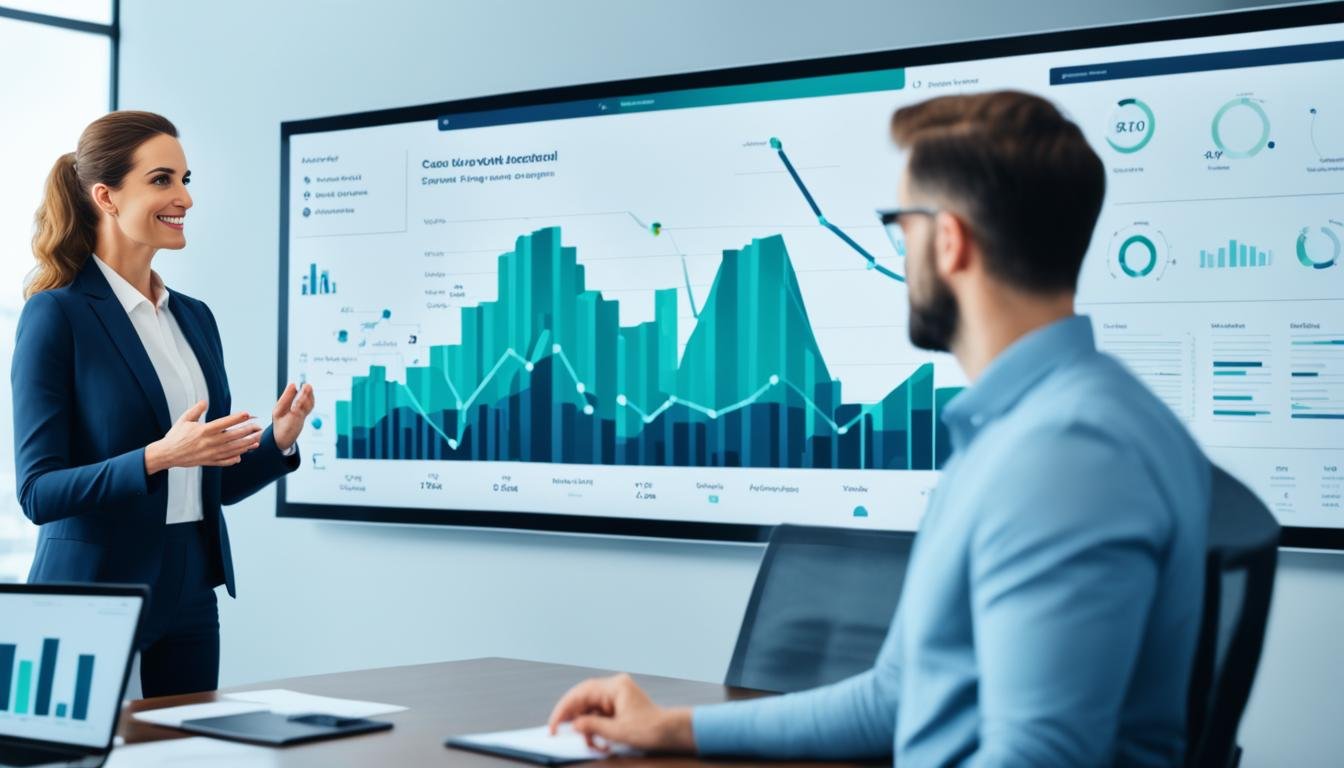Generative AI technology like ChatGPT gained 100 million users in just 60 days. This shows how fast people are adopting this new technology. As AI gets better, businesses are wondering how it will change their work and the jobs we have.
New tech often makes people unsure at first. But AI could change how we do repetitive tasks, help with making decisions, and change how businesses work. This could bring big chances for growth.
This article will look at how AI will change the future of work. We’ll see both the good and the bad sides of this new tech. By understanding AI’s effects, you can make your business ready for the future.
Key Takeaways
- AI is quickly gaining mainstream adoption, with ChatGPT reaching 100 million users in just 60 days.
- White-collar and professional jobs are more susceptible to AI disruption compared to physical or outdoor occupations.
- AI can enhance productivity in tasks like business writing, programming, customer support, and consulting.
- Generative AI systems still have limitations, such as producing biased outputs and occasional nonsensical results.
- Ongoing research is crucial to understanding the technological, ethical, economic, and social implications of AI integration.
The Rise of AI and ChatGPT: Excitement and Suspicion
ChatGPT’s launch in November 2022 has brought both excitement and doubt about AI. This AI model can write like a human, answer questions, and do many tasks. Many ask if AI might replace human jobs. Yet, businesses should not fear AI and should look into its benefits.
AI’s Rapid Adoption and the Fear of Job Replacement
AI tools like ChatGPT and GitHub Copilot are changing many fields, from software to content creation. These tools have made things more efficient and productive. But, they also make people worry about losing their jobs to AI. Companies are carefully adding AI, training their workers, and setting rules to handle this AI workplace disruption.
Historical Perspective: Embracing New Technologies
New tech has always made people uneasy, like the phone, TV, car, elevator, and fridge. At first, people doubted their impact. Now, these technologies are key to our lives. It’s normal to be cautious, but not to dismiss AI without a second thought. Businesses should see how AI can help their work and learn from history.
Trying out AI is the best way for leaders to see what it can and can’t do. By being open to new tech, companies can stay ahead in the fast-changing digital world.
“AI tools can produce realistic audio clips, images, and videos that are nearly indistinguishable from human-made content.”
AI’s Potential for Business Automation
AI business automation is changing the game by making repetitive tasks easier. It helps in HR, sales, and customer service. AI can do the boring stuff, so people can focus on important work.
Streamlining Repetitive Processes: HR, Sales, and Customer Service
In HR, AI automates employee onboarding. It sends out paperwork and training materials. Digital assistants help new employees get started fast, making the process smoother.
This makes starting a new job better for everyone. It also makes HR more efficient by cutting out manual tasks.
AI also helps in sales and customer service. It answers simple questions, so human agents can deal with harder issues. AI chatbots take care of basic customer support, giving sales teams more time to grow relationships and make sales.
AI-Assisted Onboarding and Employee Training
AI is changing how we onboard new employees. Digital assistants make sure new hires get all the info they need. This makes starting work better and more consistent.
AI also makes training better. It personalizes learning, tracks progress, and gives feedback. This helps employees learn new skills faster. By automating training, companies can focus on improving their teams for the future.
Using AI business automation is changing how companies work. It makes things run smoother, increases productivity, and lets employees do more meaningful work.

“AI can automate the delivery and receipt of necessary paperwork, company policies, and login information, eliminating delays and creating a positive experience that sets the tone for an employee’s tenure.”
will ai take over business
AI’s Role in Data Analysis and Business Decision-Making
AI has changed how businesses work, especially in data analysis and making decisions. It helps automate, improve, and support these processes. AI looks through lots of data to find patterns that are hard to see. This gives leaders important insights, helping them make fast and smart choices.
For example, AI tools can spot trends in what customers buy together. This info helps give customers the right product suggestions, making them happier and buying more. AI also looks at job applications to find patterns in hiring, making recruitment easier and better for everyone.
Personalized Recommendations and Customer Insights
AI changes how businesses understand and serve their customers. Companies like Amazon and Netflix use AI to suggest products based on what users like. This makes customers more loyal and helps sales go up.
With AI, businesses can really get to know their customers. This helps them make smarter choices about what products to make, how to market, and how to serve customers. This approach keeps companies ahead and meets customers’ changing needs.
| AI’s Impact on Business | Adoption Rate | Potential Benefits |
|---|---|---|
| Data Analysis and Decision-Making | Rapid Adoption | Improved efficiency, faster decision-making, and better-informed strategies |
| Personalized Recommendations and Customer Insights | Widespread Use | Enhanced customer experience, increased loyalty, and higher sales |
As AI gets better, its effect on business decisions and understanding customers will get stronger. Companies that use this tech will be ahead, offering great value to their customers.
AI-Powered Content Creation and Marketing
AI is getting better fast, and its role in making content is exciting and a bit worrying. Tools like Jasper can’t yet replace skilled human writers, but they can help make creating content easier. They can make many types of content, like blog posts, social media updates, sales emails, and ads.
But, AI-generated content has its limits. It might not catch the unique voice and tone of a company. This is key to connecting with people. To make sure the content fits the brand and speaks to the audience, businesses need to use human touch with AI.
AI’s Capabilities and Limitations in Content Generation
AI models can make text that sounds like it was written by a human. They can be customized to fit different brands. Tools like Jasper let you tailor the content to what each client needs. These AI tools can also make many content pieces from just one idea, which saves time and money.
AI is promising for making content, but it’s not perfect. The content might not have the depth, creativity, or emotional touch that humans do. Companies need to find a balance. Use AI to make things easier, but keep a human eye on it to keep the brand’s identity and connect with people deeply.
| AI Content Creation Capabilities | AI Content Creation Limitations |
|---|---|
|
|
Companies that use ai content creation and know how to use it will lead in ai marketing. By balancing AI and human skills, they can use ai content generation well. This keeps their content real and effective.

The Complementary Relationship: AI and Human Collaboration
As AI becomes more advanced, business leaders must think about how to use it. AI offers many benefits, but it’s important to know its limits. It’s key to use AI and human skills together for the best results.
Addressing Data Privacy and Integrity Concerns
AI raises big questions about data privacy and integrity. When data goes into AI tools, it might not be fully controlled by the user anymore. This raises concerns about how the data is used and kept safe. Companies need strong data policies and AI tools that protect sensitive data to gain customer trust.
Balancing Risks and Benefits of AI Adoption
Deciding to use AI in business is complex. AI can make things more efficient, give valuable insights, and boost productivity. But, it also has risks like job loss and biased decisions. Companies must weigh AI’s benefits against its risks. They should keep human collaboration and oversight at the heart of their work.
The future of work is about combining AI and human skills. By using both, companies can make their processes better, improve decisions, and stay ahead in the market. As AI grows, it’s important for companies to tackle challenges and seize the chances it brings.
“The most significant performance improvements are achieved when humans and machines collaborate.”
– Harvard Business Review
The Impact of AI on Jobs and the Economy
AI is changing the job market and economy in big ways. A recent survey found 37% of companies using AI have replaced workers with it. Another 44% think they will lay off workers due to AI soon. Experts say AI could automate up to 25% of work tasks in the US and Europe, causing big changes in the workforce.
But AI’s effect on jobs isn’t all bad news. It could also lead to big economic growth and new ideas. A report by the McKinsey Global Institute says AI could add about $13 trillion to the global economy by 2030. This would mean about 1.2% more economic growth each year, similar to the effects of big technological changes in the past.
Potential Job Losses and Workforce Disruptions
A 2023 survey by ResumeBuilder found 37% of companies using AI have replaced workers. Another 44% expect to lay off workers in 2024 because of AI. Goldman Sachs predicts AI could replace 300 million full-time jobs worldwide.
AI-Driven Economic Growth and Innovation
AI might lead to job losses, but it could also bring big economic growth and new ideas. The McKinsey Global Institute says AI could add $13 trillion to the global economy by 2030. This would mean about 1.2% more economic growth each year, similar to past big technological changes.
For AI to work well in the workforce, careful planning is key. We need to make sure the benefits are shared and manage the risks well. Policies should focus on creating strong social safety nets and training programs for workers to adapt to AI.

AI’s Societal and Ethical Implications
AI’s effect on jobs and the economy is a big worry, but experts see many good changes ahead. AI can make us more productive, help in healthcare, and give more people access to education. It can also tackle big social issues and make life better for everyone.
Positive Changes: Productivity, Healthcare, and Education
AI uses its power to process and analyze data, helping businesses and groups find better solutions. It can automate boring tasks, give personalized advice, and make life better for users. As AI gets better, we’ll see more of its good effects on society.
Addressing Complex Problems and Improving Daily Life
AI can change many parts of our lives, from making admin tasks easier to giving personalized advice. For instance, AI can look through lots of data to find patterns that help solve big problems. It can also do repetitive tasks, giving people more time for things they enjoy and making life better.
But AI’s big changes will also bring legal, political, and regulatory issues. We need to think about bias in AI decision-making, algorithmic transparency, and data privacy and security. This ensures AI is developed and used responsibly.
“As AI continues to evolve, the positive impact on society will become increasingly apparent, but we must also address the complex ethical and regulatory challenges that come with it.”
Jobs at Risk of AI Automation
Artificial intelligence (AI) is getting better and making some jobs more likely to be automated. It won’t replace all human jobs, but it will change many industries and jobs. Let’s look at some jobs that might be affected by AI.
Customer Service, Driving, and Administrative Roles
Jobs in customer service, like answering many questions, could be taken over by AI chatbots. These AI tools can talk to customers all day without getting tired. Driving jobs, like those for taxi and rideshare drivers, might also be changed by self-driving cars.
Jobs that involve doing the same thing over and over, like data entry, could also be automated. AI can do these tasks faster and more accurately than people, making them less necessary.
Research, Analysis, and Creative Professions
AI is also entering jobs that need research, analysis, and creativity. Jobs like market research analysts and financial analysts might see AI tools that can go through lots of data and find patterns. AI might not replace these jobs entirely, but it could change how they’re done.
People in these fields will need to learn how to work with AI. They should use both human and machine smarts to get better at their jobs.

“By 2030, nearly 12 million Americans in occupations facing shrinking demand may need to switch jobs due to automation, with AI being a key driver in automating 30% of hours worked in the US.”
As AI gets more popular, it’s important for workers and employers to know how it will change jobs. By understanding the risks and adjusting, people and companies can do well in the changing job world.
Jobs Unlikely to be Replaced by AI
AI is changing many industries, but some jobs are safe from its reach. These include teaching, healthcare, and skilled trades. They also include jobs that need a lot of human empathy and emotional smarts.
Teaching, Healthcare, and Skilled Trade Professions
Teachers need to build trust with students. They must understand social and emotional stuff that AI can’t get. Nursing also needs a human touch and empathy, which AI hasn’t yet mastered.
Jobs like plumbing and electrical work need manual skills and problem-solving. These jobs are hard for AI to automate because they require being able to adapt on the spot.
Roles Requiring Human Empathy and Emotional Intelligence
Jobs like social work, therapy, and human resources are also safe from AI. They need empathy and emotional smarts to deal with complex people issues. AI can’t yet match the human touch in these areas.
AI might help in these jobs later, but the human part will always be key. These jobs are valuable because they can’t be easily automated. They need the special qualities that make us human.
Conclusion
AI’s growth, seen in the popularity of ChatGPT, brings both hope and worry. It can automate tasks, improve decision-making, and change how we create content. Yet, it also makes us think about data privacy and the future of jobs.
Companies looking to use AI must consider both the good and the bad. They should keep valuing human skills and teamwork. The effects of AI on our society and economy are still being seen. But, it’s clear AI will keep changing how we work in the future.
When adding AI to work, a careful and thoughtful plan is needed. AI can make things more efficient and productive. But, companies must tackle issues like job changes and data privacy to fully benefit from this new technology.
FAQ
What is the widespread adoption of ChatGPT telling us about the rise of AI in business?
ChatGPT’s quick rise to 100 million users in two months shows how AI is becoming more popular in business. This growth brings both excitement and concerns about AI’s impact on different industries.
How have new technologies historically been received, and what can businesses learn from this?
New tech like the phone, TV, and fridge were once doubted but are now key to our lives. Businesses should learn from this by seeing AI’s potential to improve their work.
How can AI be used to automate repetitive business processes and tasks?
AI can automate tasks in HR, customer service, and onboarding. This lets employees focus on important tasks. It also makes it easier for customers and employees to find the information they need, making things more efficient.
How can AI enhance business decision-making and provide customer insights?
AI can analyze lots of data to give valuable insights on customers. Companies can use AI to suggest products based on what customers like, making shopping better and increasing loyalty.
What are the limitations and concerns surrounding AI-generated content?
AI tools can make creating content easier but struggle to capture a brand’s unique style. Human touch is needed to make sure the content fits the brand and connects with people. There are also worries about keeping data safe and true when using AI.
How should businesses balance the risks and benefits of adopting AI technology?
Businesses need to think about the good and bad of using AI, keeping human skills and teamwork at the core. AI can make things more efficient and insightful but also raises concerns about privacy and truth. Finding the right balance is crucial.
What is the potential impact of AI on jobs and the economy?
AI could change the job market and economy a lot. It might automate up to 25% of work, causing big changes. But, it could also lead to more growth and innovation. The key is to plan well to share the benefits and manage the risks.
How can AI have a positive societal impact beyond just business applications?
AI can help solve big social problems and make life better for people. By using AI’s power to process and analyze data, businesses and groups can create better solutions for issues like climate change and inequality.
Which job categories are most vulnerable to AI automation, and which ones are less likely to be replaced?
Jobs in customer service, driving, and admin are at higher risk of being automated by AI. But, jobs needing empathy, emotional smarts, and manual skills like teaching and healthcare are safer from AI takeover.
